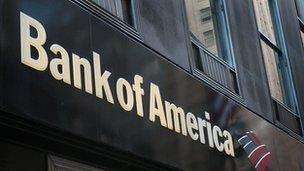Bank of America found liable in US mortgage fraud trial
- Published

Bank of America bought Countrywide Financial in 2008
Bank of America's Countrywide Financial unit has been found liable for defrauding two US government-backed mortgage companies by a federal jury.
Countrywide, which was acquired by Bank of America in 2008, was accused of selling thousands of defective loans to Fannie Mae and Freddie Mac.
The ruling is a major win for the US government, which launched the case in the wake of the financial crisis.
The Justice Department is seeking as much as $848m (£523m) in penalties.
The judge who presided over the trial said a civil penalty will be decided at a later date.
A former Countrywide executive Rebecca Mairone was also found liable on a civil fraud charge. She was the only individual to be sued by the government in the case.
'High-speed swim lane'
The month-long trial focused on a Countrywide programme that was internally called "Hustle" or "high-speed swim lane" which allowed loans to be processed quickly without checking their quality.
The wrongdoing, which mostly took place before Countrywide was acquired, was discovered after a whistleblower filed a lawsuit against the firm.
Manhattan US Attorney Preet Bharara welcomed the ruling.
"In a rush to feed at the trough of easy mortgage money on the eve of the financial crisis, Bank of America purchased Countrywide, thinking it had gobbled up a cash cow," he said in a statement, external.
"That profit, however, was built on fraud, as the jury unanimously found.
"In this case, Bank of America chose to defend Countrywide's conduct with all its might and money, claiming there was no case here. The jury disagreed," he said.
Mr Bharara added that US authorities would "never hesitate to go to trial to expose fraudulent corporate conduct and to hold companies accountable, particularly when it has caused such harm to the public".
Subprime investigations
The US economy witnessed a big boom in its housing market in the lead up to the 2007-08 global financial crisis.
As house prices continued to rise, many banks looked to cash in on the boom by creating complex financial products that grouped together home loans.
However, a collapse in the housing market saw the value of those investments plummet as the underlying mortgage holders became unable to repay their debts.
This snowballed into something called the subprime crisis, which hurt investors globally and caused billions of dollars in losses.
Since then, banks have been under pressure to resolve claims on potentially faulty mortgages.
The US Department of Justice is investigating at least nine banks over their sales of mortgage-backed securities.
- Published20 October 2013
- Published1 October 2013
- Published26 September 2013